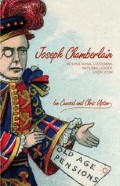Abstract
Joseph Chamberlain served as British Secretary of State for Colonies for eight years (1895–1903). Southern African affairs dominated his activities throughout this period. He was the only Colonial Secretary who ever visited South Africa. His policies had a massive impact on the subcontinent and contributed to the outbreak of the Anglo–Boer War in 1899. As a result he is mentioned, if not extensively discussed, in all books focusing on Anglo–South African relations in the period. This is the case both in contemporary books written in Chamberlain’s lifetime and also in historical works published in the course of the next century. In some books, such as Garvin and Amery’s The Life of Joseph Chamberlain, he is portrayed as a heroic figure.1 On the other hand, cartoonists on the European continent at the time of the Anglo–Boer War portrayed him as a butcher in reaction to his spirited defence of the concentration camp policy of British military authorities in South Africa.2 The distinguished South African historian Hermann Giliomee recently described Chamberlain as a conspirator.3 At the centenary of Chamberlain’s death it is opportune to revisit his activities and impact, especially with regard to South Africa. It is the specific objective of this chapter to highlight the dissonant reputation that this controversial historical figure gained in South Africa, both in his lifetime and also in South African historical tradition.
Access this chapter
Tax calculation will be finalised at checkout
Purchases are for personal use only
Preview
Unable to display preview. Download preview PDF.
Notes
J.L. Garvin and J. Amery, The Life of Joseph Chamberlain, 6 volumes (London: Macmillan, 1932–68).
M.C.E. van Schoor, Spotprente van die Anglo–Boereoorlog (Cape Town: Tafelberg, 1981), pp. 49, 84.
H. Giliomee, The Afrikaners: Biography of a People (Cape Town: Tafelberg, 2003), p. 242.
P.T. Marsh, Joseph Chamberlain: Entrepreneur in Politics (New Haven and London: Yale University Press, 1994), p. 156.
S.B. Spies, ‘Chamberlain, Joseph’, in D.W. Krüger and C.J. Beyers (eds), Suid-Afrikaanse Biografiese Woordeboek, part III (Cape Town: Tafelberg Publishers for the Human Sciences Research, 1977), p. 144.
A.N. Porter, The Origins of the South African War, Joseph Chamberlain and the Diplomacy of Imperialism, 1895–99 (Manchester University Press, 1980), p. 63.
T.R.H. Davenport, The Afrikaner Bond, The History of a South African Political Party, 1880–1911 (Oxford University Press, 1966), pp. 161–2.
S.J.P. Kruger, The Memoirs of Paul Kruger, Four Times President of the South African Republic, Told by Himself (London: T. Fisher Unwin, 1902), pp. 271–3, 279.
J.C.G. Kemp, Vir Vryheid en vir Reg (Cape Town: Nasionale Pers, 1941), p. 83.
W.K. Hancock and J. van der Poel (eds), Selections from the Smuts Papers, Volume I: June 1886–May 1902 (Cambridge University Press, 1966), document 41, p. 152.
L.E. van Niekerk, Kruger se Regterhand, ‘n Biografie van dr W.J. Leyds (Pretoria: J.L. van Schaik, 1985), p. 144.
P. Lewsen (ed.), Selections from the Correspondence of John X. Merriman 1890– 1898 (Cape Town: The Van Riebeeck Society), no. 44, 1963, pp. 48, 103, 209n and 229. The word ‘betwattle’ can probably be taken to mean ‘robbed of common sense’.
V. Solomon (ed.), Selections from the Correspondence of Percy Alport Molteno 1892–1914 (Cape Town: The Van Riebeeck Society), second series no. 12, 1981, pp. 11, 14, 57.
B. Williams, Cecil Rhodes (New York: Greenwood Press, 1968 reprint), pp. 318–19.
M.T. Steyn, ’n Bittereinder aan die Woord, Geskrifte en Toesprake van Marthinus Theunis Steyn, edited and annotated by M.C.E. van Schoor (Bloemfontein: Oorlogsmuseum van die Boererepublieke, 1997), p. 20.
J.S. Marais, The Fall of Kruger’s Republic (Oxford University Press, 1961), p. 69.
F.A. van Jaarsveld, Van Van Riebeck tot P.W. Botha, ’n Inleiding tot die Geskiedenis van die Republiek van Suid-Afrika (Johannesburg: Perskor, 1982), pp. 228–32.
F. Pretorius, Die Anglo–Boereoorlog 1899–1902 (Kaapstad: Struik Uitgewers, 1998), pp. 9–13.
H. Giliomee, ‘Afrikaner Nationalism, 1875–1899’, in F. Pretorius (ed.), A History of South Africa, from the Distant Past to the Present Day (Pretoria: Protea Book House, 2014), p. 236.
H. Bradford, ‘The Defiance of the Bittereinder Women’, in B. Nasson and A. Grundlingh (eds), The War at Home: Women and Families in the Anglo–Boer War (Cape Town: Tafelberg, 2013), p. 48.
J.C.G. Kemp, Die Pad van die Veroweraar (Kaapstad Nasionale Pers, 1942), p. 27.
Ibid., p. 41; J. Wilson, C.B.: A Life of Sir Henry Campbell-Bannerman (London: Constable, 1973), p. 349.
Buurman , Oorlogswolke oor die Republieke, Die herinneringe van ’n Boere-offisier (Johannesburg: Voortrekkerpers Beperk, 1944), pp. 209–11.
F.V. Engelenburg, General Louis Botha (London: George G. Harrap & Co., 1929), pp. 106–10.
W.K. Hancock and J. van der Poel (eds), Selections from the Smuts Papers, Volume II, June 1902–May 1910 (Cambridge University Press, 1966), document 204, p. 58; Spies, ‘Chamberlain, Joseph’, p. 146; Engelenburg, Botha, p. 113.
G.D. Scholtz, Die Ontwikkeling van die Politieke Denke van die Afrikaner, Deel V, 1899–1910 (Johannesburg: Perskor-Uitgewery, 1978), p. 262.
The Star, 1 July 1903, quoted in P.M.B. Schutte, ‘Die verhouding tussen Boer en Brit in Transvaal, 1902–1910’ (MA dissertation, University of Pretoria, 1979), p. 61.
W.K. Hancock, Smuts, The Sanguine Years 1870 – 1919 (Cambridge University Press, 1962), p. 193.
J.A. Wiid, ‘Weeropbou (1902–1910)’, in A.J.H. van der Walt, J.A. Wiid and A.L. Geyer (eds), Geskiedenis van Suid-Afrika, vol. 1 (Cape Town: Nasionale Boekhandel Beperk, 1951), p. 628; Engelenburg, Botha, p. 116.
M.C.E. van Schoor, Christiaan Rudolph de Wet, Krygsman en volksman (Pretoria: Protea Boekhuis, 2007), p. 222.
Editor information
Editors and Affiliations
Copyright information
© 2016 Jackie Grobler
About this chapter
Cite this chapter
Grobler, J. (2016). Joseph Chamberlain’s Reputation in South Africa. In: Cawood, I., Upton, C. (eds) Joseph Chamberlain. Palgrave Macmillan, London. https://doi.org/10.1057/9781137528858_3
Download citation
DOI: https://doi.org/10.1057/9781137528858_3
Publisher Name: Palgrave Macmillan, London
Print ISBN: 978-1-349-70803-1
Online ISBN: 978-1-137-52885-8
eBook Packages: HistoryHistory (R0)

